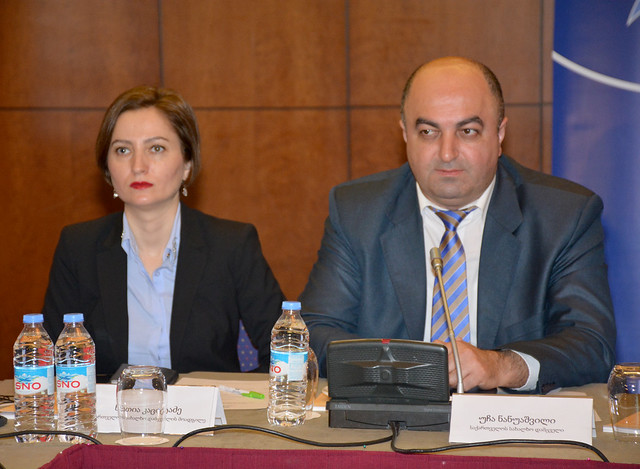Rights Situation of Women and Gender Equality in Public Defender’s Parliamentary Report
On May 13, 2016, the Public Defender presented a report on women's rights and gender equality in Georgia to representatives of governmental agencies, international organizations and non-governmental sector.
According to the Public Defender’s Parliamentary Report 2015, protection of women's rights and gender equality are still challenges in the country.
The study results of gender mainstreaming practice and challenges indicate that majority of employees at the executive government level, ministries and offices of state ministries are women, though they are seldom represented on leading positions. None of the Ministries has a structural unit of gender equality. The Public Defender supports the introduction of a quota system for increasing women's political participation.
The subject of Public Defender's recommendation has repeatedly been women's labour rights. However, the ratification process of the Maternity Protection Convention 183 of the International Labour Organization has not yet been started. Despite the definition of a single parent status, special measures of protection and assistance are not being implemented, while the status of parent with many children has not even been defined.
Despite the fact that the rights situation of women rights defenders is not topical in Georgia, the Public Defender's Office has identified a number of cases when law enforcement officers had trouble with properly assessing the risks and threats against women rights defenders. It is important to take effective steps for the implementation of the UN General Assembly resolution of 2013 on the protection of women rights defenders.
The level of public awareness on the rights, reproductive and sexual health, existing services and programs are low. The UN Maternal Mortality Estimation Inter-Agency Group put Georgia in the so-called Group B; i.e. the country does not have a complete database of maternal mortality. The form of abortion, such as gender-based sex selection, is still spread in the country.
Prevention and management of cases of early marriage are still problematic. In 2015, marriages of 611 juveniles were registered, while the number of juvenile parents at the moment of their child registration was almost three times higher. 1 449 such cases were reported in 2015. Cases of dropping out of school before finishing even the basic level of education by students are especially alarming. In 2015, 408 students aged between 13 and 17 dropped out of school for marriage reasons.
The reality of violence against women and domestic violence is very difficult. The subject of particular concern is killing of women. According to the restraining orders issued in 2015, 2726 cases of domestic violence were identified, which involved 5 106 persons. According to the data of the Chief Prosecutor's Office, 28 cases of murder and attempted murder of women were reported in 2015. Out of these, 16 cases were domestic violence, while 12 cases were committed on other motives. Majority of the crimes were committed by partners, former partners or by a person who had been denied partner relations.
It should be noted that women drug addicts have double barriers in access to treatment or harm reduction programs. Placement of women drug addicts in a shelter for victims of domestic violence is also a problem, as the shelter cannot provide them with their needs-based services.
Monitoring of the shelter for victims of human trafficking revealed that situation is favorable there. However, the institution does not have standards, according to which the living conditions and services must be arranged.
On May 17, 2012 and 2013, the International Day Against Homophobia and Transphobia, hate violence was committed against the people who had been gathered for realization of their constitutional right. We welcome peaceful celebration of the International Day Against Homophobia and Transphobia on May 17, 2015. It is still a challenge for transgender people to change sex record in the civil acts, which in turn hinders education, employment or other processes.
















